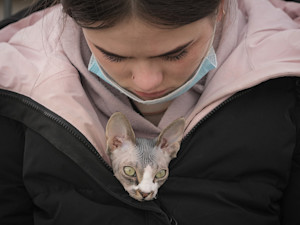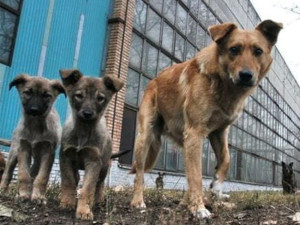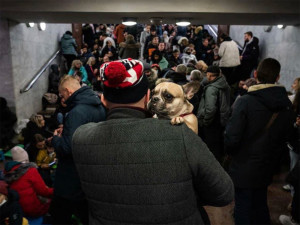Meet Andrew Kushnir, “the Nomad Vet” Helping Refugee Pets in Ukraine
The veterinarian on helping out, making a difference, and the finer things in life (mostly dogs and music).
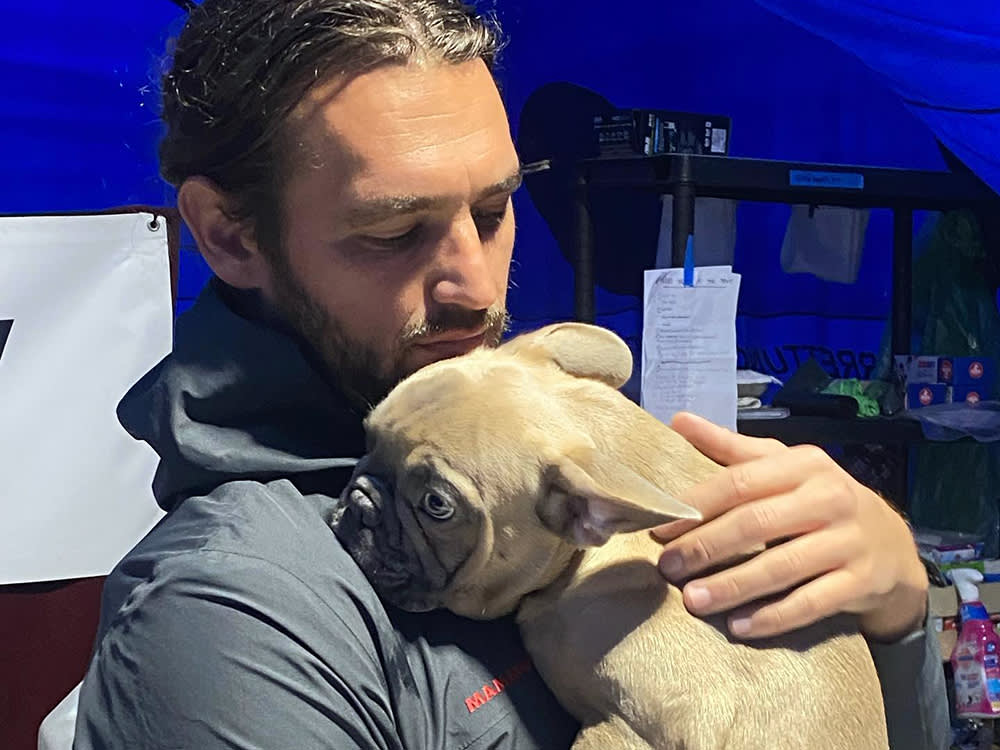
share article
It’s been nearly five months since Russia invaded Ukraine, and the human rights crisis remains a global concern. Despite Russia’s inequitable motives, the people of Ukraine have refused to give up their homes. As so many fight for the survival of their countryopens in a new tab and its people, countless animals have been abandoned without resources. Luckily, many organizationsopens in a new tab have been working tirelessly to provide food, shelter, and safety for these creatures but they can use all the help they can getopens in a new tab. As Real Housewives of New York's Bethenny Frankel has provenopens in a new tab, reality TV stars can and have been the first people to step up in a crisis. That’s exactly what Andrew Kushniropens in a new tab is doing.
After war broke out, the Vanderpump Dogsopens in a new tab alum shortly began helping to sort and send supplies to Ukraine before quickly traveling to the Ukrainian-Polish border to make a more tangible impact. With help from The International Fund for Animal Welfare (IFAW), Kushnir has been working to aid refugees and their pets, while also assisting shelters, sanctuaries, and zoos in the country. He detailed his experience and how you can get involved — but not before we, of course, asked about working with Lisa Vanderpump and his adorable dog Henry.
Tell me about your career. Was veterinary work something you always gravitated towards?
I never saw myself as the kind of vet you’d find working in your local small animal clinic. I always wanted to be working with the most vulnerable animal populations out beneath the open sky. I was born in San Diego, California, and grew up with a passion for growing things and exploring natural spaces. In college, I studied ecology and native Southern California ecosystems and was just fascinated by the connectedness of everything in nature. I was actually in a band for several years after college before deciding I wanted to return to science, this time as a veterinarian.
To make sure that this was a field I wanted to dedicate my life to, I spent some time shadowing a vet and volunteering at a center for street dogs in India before starting veterinary school at St. George’s University in Grenada. During my vet school summers, I spent a few months living and working as a shepherd to Carpathian water buffalo, high in the mountains of Western Ukraine and also went to Uganda to volunteer with the USPCA and help with the annual health checks of about 50 chimpanzees on Ngamba Island.
After graduating from vet school I completed a shelter medicine internship followed by a Wildlife Medicine internship, which I finished in August of 2021. I spent November and December of 2021 living and working at a wildlife center in Costa Rica and was ready to start a seasonal position at a wildlife center in San Diego before the war in Ukraine broke out.
Let's talk about the work you’re doing in Ukraine.
I have been working with IFAW (the International Fund for Animal Welfare) at the Ukrainian-Polish border to provide veterinary support to pets of refugees. Since war broke out millions of Ukrainians have fled the country to safety, having to pack their lives into a few suitcases and duffel bags — and very often with a pet (or 10) with them. Many of these folks had to leave abruptly from their homes and braved a multi-day journey to the border followed by a lengthy weight at the border crossing — at the start of [the] war the border crossing wait could be as long as 72 hours.
Having to leave their homes so abruptly, pet parents often reach the border with next to no supplies for their animals. Animals reach us dehydrated, malnourished, some with physical wounds from bombings, some sick, and some completely healthy. We essentially act as a lily pad for refugees once they cross the border, since they often are heading to another European country on their journey. We provide them with veterinary support along and set them up with supplies for the rest of the journey — food, carriers, leashes, muzzles, flea/tick and deworming, clothing, etc.
How much time have you spent in Ukraine? What obstacles have you faced?
In total, I have been over here for about three months. Since being here at the refugee camp, I have felt the full kaleidoscope of human emotions. Every moment here I am surrounded by an endless stream of people seeking shelter and safety from war, who have had to pack their entire lives into a few suitcases and grocery bags. When they reach the refugee camp, volunteers of humanitarian organizations from all over the world greet them with smiles, warm food and drink, and the assurance that they are safe. For many folks, their pet is family and a great comfort at this time, so being able to provide veterinary and supportive care to their critters is an exceptionally profound service to offer.
What inspired you to help out?
My father and his family were once refugees fleeing Ukraine during World War Two, and I knew that I had to step up in whatever capacity I could to help support people fleeing conflict. We veterinarians don’t just help animals; we also help people through animals.
To pivot here a bit, you recently featured on the first season of Vanderpump Dogs — how’d you get involved in that?
Yes, Vanderpump Dogs! That was a lot of fun to be a part of and they have a great facility in LA for rescued dogs. I had just finished a Shelter Medicine Internship and was in the midst of a Wildlife Medicine Internship when I was asked if I’d like to help at Vanderpump Dogs.
What was your experience like on the show? Any juicy Lisa [Vanderpump] stories?
I had a really great experience on the show. It took some adjusting to, as that was my first experience working as a veterinarian with cameras and crew around, but ultimately I just did my job and met some really great people.
Your dog, Henry, is adorable! How did he come into your life?
Oh, Henry is the best! Henry was actually one of my patients at a shelter I was working at. I was scheduled for surgery one day and was going around doing my pre-surgical exams on all the cats and dogs and when I entered the dog ward I saw the adorable, quiet Boxer sitting and looking up at me. I grew up with Boxers and just love the breed (yes, yes, despite some of their medical predispositions) and really expected Henry to get hyper and energetic once I entered his run. But he didn’t! He stayed seated but as I knelt down to listen to his heart with my stethoscope, he gently stood up and put his whole head in the crick of my neck and just stayed there. From that moment, I knew he was coming home with me. It was pretty surreal that I made the decision while I was neutering him.
What’s his personality like?
Henry is the calmest and most self-sufficient Boxer I’ve ever met. If I’m home reading or working on something, he will find the comfiest place to lie down and will just sleep. If we’re outside in the yard he’s always “securing” the castle and doing his best to chase lizards and gophers — though he’s never really even come close to catching one, bless him. He is immensely loyal to me and to my family and never wanders too far away from me when I have him off-leash, constantly checking to see where I am.
You’re also very musically talented! You can often be found on Instagram playing piano, ukulele, or even bongos — many times for Henry. Tell me about your musical background and, more importantly, how Henry reacts when you play for him.
I really don’t know where I’d be in life or who’d I be if I didn’t have music. I started playing the banduraopens in a new tab (the national instrument of Ukraine) when I was five, started the piano at six, and joined my first jazz band in eighth grade playing percussion! From age 13 until 25, I was almost consistently in some kind of band or another. I spent a year in India before starting vet school and the night before I flew out, a good friend gifted me a small ukulele, which I proceeded to play every day overseas. Now, the ukulele is something I almost always bring with me on long trips. In fact, I have one with me now! Musical expression is one of the most impactful forces in my life.
How can readers help out with your efforts in Ukraine? Any specific organizations they should consider donating to?
It is truly amazing to witness the incredible outpouring of support for Ukraineopens in a new tab from all around the world, especially here at the refugee camp where organizations and volunteers have come from all over the world to do what they can. Some of the organizations I am seeing here at the camp that are providing on-the-ground support include Sauveteurs san Frontieres, Siobhan’s Trust, Humanity First, United Sikhs, and of course, IFAW Global.
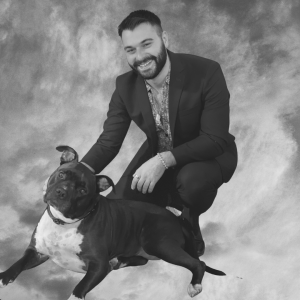
Sean Zucker
Sean Zucker is a writer whose work has been featured in Points In Case, The Daily Drunk, Posty, and WellWell. He has an adopted Pit Bull named Banshee whose work has been featured on the kitchen floor and whose behavioral issues rival his own.
Related articles
![a cat rests in a girl's jacket]() opens in a new tab
opens in a new tabMeet the Photographer Documenting Pets at the Ukraine Border
Christopher Furlong is helping fleeing pets and people tell their stories.
![dr lachlan campbell australian vet in ukraine]() opens in a new tab
opens in a new tabAustralian Vet Dr. Lachlan Campbell on Saving Animals in Ukraine
Bombs, mines, and military checkpoints won’t stop him from evacuating animals from Irpin and running a pop-up vet clinic in Lviv for refugees and their pets.
![A man holding a dog in a crowded space in Ukraine.]() opens in a new tab
opens in a new tabHow You Can Help Ukraine’s Animals
These Ukrainian rescue organizations need our support. Here’s how to get it to them ASAP.
